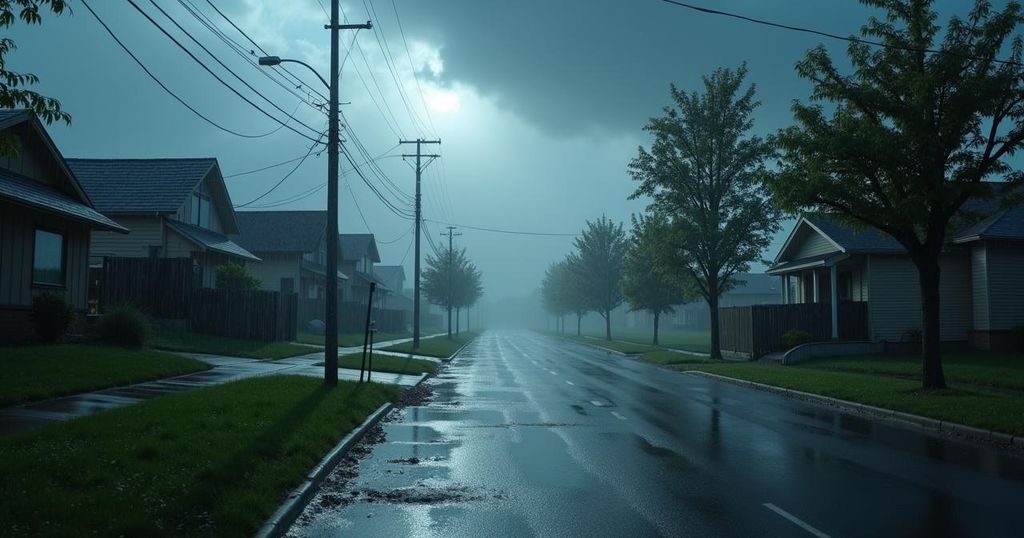Climate Change Intensifies Hurricane Helene’s Impact and Threatens Hurricane Milton
A recent study has concluded that climate change has heightened Hurricane Helene’s rainfall by 10% and wind speeds by 11%. These changes are linked to rising ocean temperatures, which are now 200 to 500 times more probable due to global warming. Scientists warn that similar patterns could emerge with Hurricane Milton, emphasizing the need for enhanced disaster preparedness in the face of increasing hurricane severity driven by climate change.
Recent scientific assessments indicate that human-induced climate change has intensified Hurricane Helene, increasing its rainfall by approximately 10% and its wind speeds by about 11%. The World Weather Attribution group reported that the warming climate augmented Helene’s wind speeds by roughly 13 miles per hour and substantially increased the likelihood of the high sea temperatures that fueled this storm, making them 200 to 500 times more probable. As Hurricane Milton approaches the Florida coast, scientists assert that it may experience similar enhancements due to climate change. Professor Ben Clarke, a climate researcher from Imperial College London and co-author of the study, explained that the warmer air can hold more moisture, resulting in higher rainfall totals. He noted, “Hurricane Helene and the storms that were happening in the region anyway have all been amplified by the fact that the air is warmer and can hold more moisture, which meant that the rainfall totals—which, even without climate change, would have been incredibly high given the circumstances—were even higher.” The potential for similarly severe impacts with Hurricane Milton raises concerns among researchers. The scientists issued a warning that the continued combustion of fossil fuels will likely lead to more hurricanes akin to Helene, which inflicted catastrophic inland flooding, resulting in over 230 fatalities—more than the number lost to winds. Helene brought, unprecedented amounts of rainfall totaling over 40 trillion gallons to various regions, significantly worsened by anthropogenic climate change influences. It was found that hurricanes of such intensity were once expected only once every 130 years; however, under current conditions, their occurrence is approximately 2.5 times more frequent. From the assessment conducted by the World Weather Attribution, it was noted that the organization employs peer-reviewed methodologies to evaluate the influence of climate change on extreme weather events rapidly. In a separate study, researchers from the Lawrence Berkeley National Laboratory found that climate change contributed to 50% more rainfall in parts of Georgia and the Carolinas and made extreme rainfall events up to 20 times more likely. Professor Kim Cobb from Brown University highlighted uncertainties concerning the exact degree to which climate change exacerbates storms but confirmed that such changes result in increased power and devastation of tropical disturbances. She stated, “We know that it’s increasing the power and devastation of these storms,” suggesting that both Helene and Milton should prompt serious reconsideration of emergency preparedness and resilience strategies given the dangerous implications of fossil fuel reliance. As these storms illustrate the potential future threat of climate change, Professor Clarke emphasized the importance of modifying energy systems to influence projected risk trajectories positively. As future warming continues unabated over the coming decades, increased frequency and intensity of hurricanes are anticipated. This reinforces the significance of addressing climate change proactively to mitigate adverse outcomes.
Hurricanes are natural disasters that can bring devastating wind and rainfall, often resulting in loss of life and property. Scientific consensus has increasingly indicated that climate change, primarily driven by human activities such as the burning of fossil fuels, is amplifying the severity of such extreme weather events. Hurricane Helene and its impacts serve as a case study illustrating the correlation between climate change and increased hurricane intensity. The phenomenon not only affects coastal areas but has implications for inland flooding and overall disaster preparedness as weather patterns evolve.
In conclusion, scientific analyses reveal that human-induced climate change significantly contributes to the increasing intensity and frequency of hurricanes, exemplified by Hurricane Helene. With Hurricane Milton’s impending threat, scientists warn that similar patterns of enhancement due to climate change may be expected. As the risks associated with hurricanes escalate, addressing climate change through sustainable measures becomes imperative for effective disaster preparedness and resilience against future storms. Support from credible scientific assessments, presence of fatalities primarily due to inland flooding as opposed to wind, and analysis demonstrating the augmented rainfall show a compelling link between climate change and hurricane impacts. \n
Original Source: phys.org




Post Comment